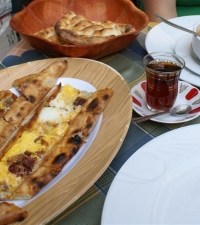Highlights of Turkey: Street Food

Street food is an essential and delicious aspect of everyday Turkish life. An authentic Turkish street banquet will stimulate the senses of any visitor, from hot and hearty fast fare to sweet and savoury treats.
When most people think of Turkey, the humble kebab (or kebap, in Turkish) tends to be the first thing that springs to mind. Certainly, the kebap is ubiquitous, both in Turkey and across the region (as well as in most countries across the world with large Greek, Turkish or middle eastern communities) but the Turkish version is anything but humble and vastly superior from what you might find in the backstreets of London or Berlin. Kebap actually means ‘small pieces of meat’ (usually lamb, chicken or beef) which are flavoured, cooked and served in a bewildering variety of ways. Try the İskender kebap, Adana kebap, patlıcan kebap and şiş (shish) kebap, and the more familiar, döner kebap.
Other mainstays of street cuisine are köfte (spiced meatballs), pide – a slightly leavened, flat pizza-like bread with various toppings, and lahmacun – a paper-thin round piece of flatbread, with a cheese and tomato layer often sprinkled with mincemeat. If you are a strict vegetarian, you won’t go hungry. Try veggie pides or delicious cheese, spinach or potato börek – multi-layered flaky pastries wrapped around the filling. There’s always boiled or grilled corn on the cob to whet the appetite, often sprinkled with salt or spices and, in winter, gently roasted chestnuts. Pastry lovers in a hurry will love simits – crisp, ring-shaped, savoury rolls covered with sesame seeds, or try an açma – a soft and oily version of a bagel. Pick up a simit or açma on the go from street vendors wheeling their glass-fronted push carts. Those with a sweet tooth will relish the amazing array of honey-drizzled cakes and pastries, the most famous of which is baklava. You can feel your teeth rotting with every bite. To help with the digestion, try ayran, a salty yogurt drink. You will see it everywhere and Turks consume it by the vat-load.
Istanbul Street Food
Turkey has a rich culinary heritage. Turkish cooking is considered to be one of the world’s great cuisines with many regional variations and specialities. Naturally, this diversity extends to street food.
When in Istanbul, try the popular kaşarlı dürüm – a toasted wrap with cheese and döner filling, balik ekmek – freshly cooked fish served inside a bun of bread, pilav – steamed rice with chicken and chickpeas, and midye dolma – stuffed mussels with rice, pine nuts and raisins. The truly adventurous might like to try aromatic kokorec – lamb or goat intestines often stuffed with sweetbreads. If you get the chance to step into Asia by crossing the Bosphorus, try patsos – a sandwich composed of French fries and sausage topped with kaşar (cheese).
Most visitors to the city will find themselves gravitating towards Taksim Square, the thumping heart of modern Istanbul and the main entertainment and shopping district. Here you can sample Islak hamburger which consists of a garlic meatball in a tiny bun that is dipped in a pepper sauce and reheated. Istanbul winters can be bone-freezing affairs so try washing down the döner with boza – a slightly fermented wheat drink that is generally only available during the darker months.
Ankara Street Food
Ankara, Turkey’s capital and second city, offers particularly good köfte ekmek – spicy meatballs grilled on charcoal and served inside crusty bread, tavuk döner – döner made with marinated chicken, kumpir – a baked potato crammed to the max with a variety of toppings, and gözleme – a savoury rolled pastry with a selection of tasty fillings.
Izmir Street Food
Visitors to Izmir, Turkey’s third city should try kokoreç, made exclusively from milk-fed lamb, grilled on hot charcoal and stuffed into a grilled bread quarter, çöp şiş – a kebab of tiny milk-fed lamb cuts mounted on mini skewers and boyoz – a hot and greasy flaky pastry, baked in a masonry oven and served with a hard-boiled egg. The truly daring might try kelle söğüş – a slightly spicy blend of cheek, tongue, brain and eyes from a boiled sheep’s head which is cooled and marinated in olive oil. It’s considered to be a local delicacy but it’s certainly not for the faint-hearted.
Other Specialties
Further afield there’s tantuni, a spicy flatbread wrap consisting of julienned lamb, stir-fried with a hint of cotton oil (from the industrial town of Mersin in southern Turkey) and ciğer dürüm –skewers of marinated grilled lamb liver, tail fat and onions wrapped in flatbread and seasoned with cumin and sumac (from Urfa, a city with a mixed Turkish, Kurdish and Arab heritage).
Finally, along this finger-licking journey, visitors to remote Gaziantep, near the Syrian border, might like to try beyran – rice topped with the soft meat and neck fat of lamb or fıstıklı kebap, an Adana kebab without the hot spice but with ground pistachios added to the mincemeat.
Afiyet olsun!
By Jack Scott, author of Perking the Pansies, Jack and Liam move to Turkey, a bitter-sweet tragi-comedy recalling the first year of a gay couple in a Muslim land.
- My Life Abroad -
A selection of expat stories

"A fun compulsive read!"
J. Matcham, Amazon
"I strongly advise people ready to live abroad to read this book!"
Patrice, Amazon

 Highlights of Istanbul
Highlights of Istanbul Highlights of Turkey
Highlights of Turkey Driving: Life in the fast lane
Driving: Life in the fast lane